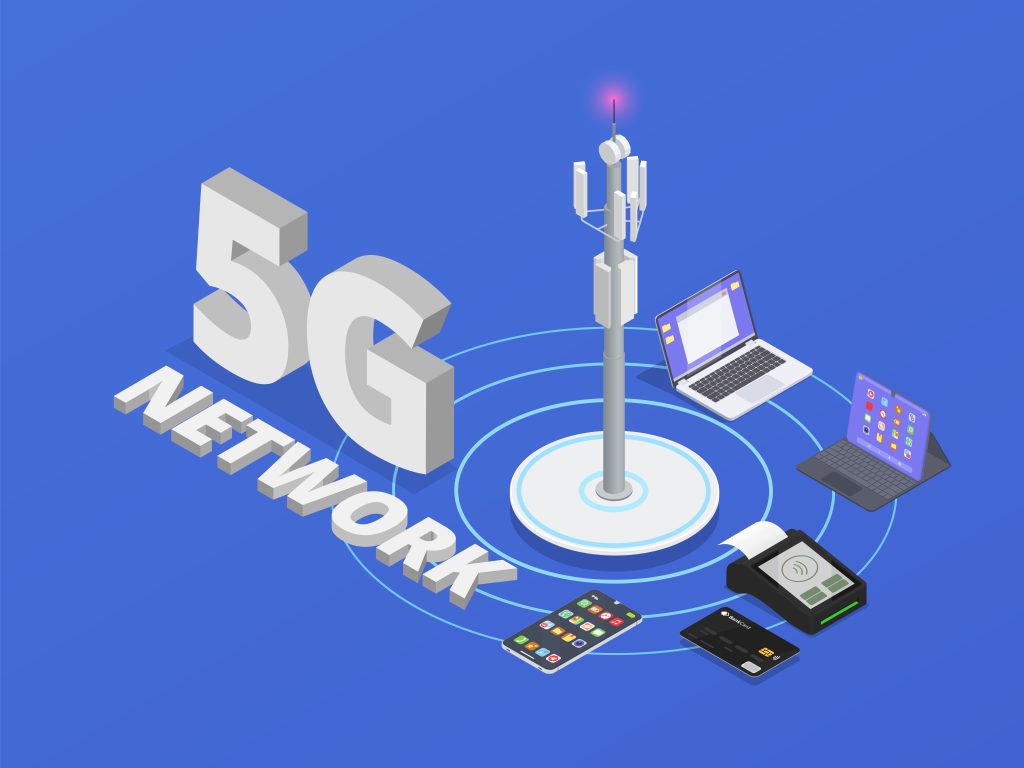Introduction
The evolution of telecommunications has seen several milestones, from the first telephone call to the dawn of the internet. However, none have generated as much buzz and excitement as 5G. In the hyper-connected world, 5G technology has emerged as a game-changer, promising unprecedented speed, low latency, and massive device connectivity. This fifth-generation wireless technology is not just an incremental improvement; it’s a leap into the future. Here’s a sneak peek of 5G in Canada, its significance and how Canada utilizes this tech to boost its economy.
5G Technology

Before we explore the specifics, let’s define what 5G technology is. At its core, 5G stands for the fifth generation of wireless technology. It succeeds 4G (LTE) and promises much more than just faster internet on your smartphone.
Key Features and Advantages
- Ultra-Fast Speeds: One of the most talked-about aspects of 5G is its blazing-fast speeds. We’re talking about download and upload speeds that are up to 100 times faster than 4G. This means you can download a high-definition movie in seconds, not minutes.
- Low Latency: Latency is the time it takes for data to travel from one point to another. 5G technology significantly reduces latency, making real-time applications like video conferencing, online gaming, and autonomous vehicles more reliable and efficient.
- Massive Device Connectivity: 5G isn’t just about your smartphone. It’s about connecting everything seamlessly. With 5G, we can connect a massive number of devices simultaneously. This is crucial for the Internet of Things (IoT), where everyday objects are interconnected to make our lives more efficient.
Use Cases and Potential Applications of 5G
- Enhanced Mobile Experiences: 5G will revolutionize how we use our mobile devices. From smoother video streaming to augmented reality applications, the improvement in mobile experiences will be tangible.
- Internet of Things (IoT): Imagine a world where your refrigerator can order groceries for you when it senses you’re running low on essentials. This is the power of 5G in IoT, where devices communicate with each other seamlessly.
- Industrial Automation: Industries will benefit from 5G by enabling automation at a level we’ve never seen before. Factories can become more efficient, reducing costs and increasing productivity.
- Healthcare Innovations: Telemedicine will take a giant leap with 5G. Remote surgeries, real-time patient monitoring, and instant access to medical records will become commonplace.
- Smart Cities: 5G is the backbone of smart cities. From traffic management to energy efficiency, it will enable cities to become more sustainable and livable.
The Canadian Landscape

Now that we have a grasp of 5G’s significance, let’s focus on Canada’s current state and why 5G is essential for the country.
Current State of Canadian Connectivity
- 4G Infrastructure: Canada has a robust 4G infrastructure, but 5G is poised to take things to the next level. The 4G network served us well, but as data demands grow, it’s time for an upgrade.
- Rural Connectivity Challenges: While urban areas enjoy fast internet, rural regions face connectivity challenges. 5G has the potential to bridge this digital divide by providing high-speed internet to remote areas.
The Need for 5G in Canada
- Economic Competitiveness: In a global economy driven by technology, having a strong 5G network is crucial for Canada’s competitiveness. It will attract investment, foster innovation, and create jobs.
- Bridging the Urban-Rural Divide: 5G can bring the benefits of high-speed internet to rural communities, improving their quality of life and opening up new opportunities.
5G is not just about faster internet on your phone. It’s a technological leap that will revolutionize industries, healthcare, and our daily lives. Canada, with its robust 4G infrastructure and need for connectivity in rural areas, stands to gain significantly from embracing 5G technology.
Government Initiatives
Canada’s journey into the realm of 5G technology is not just a matter of private enterprise. The government plays a significant role in shaping its adoption and implementation.
- Federal Investment and Policy Framework: The federal government has recognized the importance of 5G technology and has made substantial investments to support its development. These investments not only boost research and innovation but also aim to ensure that 5G is accessible to all Canadians.
- Provincial Support and Collaborations: Provinces across Canada are actively collaborating with federal initiatives to accelerate the deployment of 5G. Partnerships between federal and provincial bodies are crucial for creating a cohesive approach to 5G infrastructure.
Technical Challenges Linked with 5G in Canada

While 5G holds immense promise, it’s not without its technical challenges that need to be addressed for a successful rollout.
Infrastructure Development
Tower Deployment
One of the primary technical challenges in implementing 5G is the deployment of the necessary infrastructure, particularly the extensive network of towers required to support the high-frequency bands used by 5G. This requires careful planning, permits, and collaboration between government and private entities.
Spectrum Allocation
Allocating the right spectrum for 5G is essential for optimal performance. The government must manage spectrum resources efficiently to avoid interference and ensure a seamless 5G experience.
Security Concerns
Cybersecurity Measures
With increased connectivity comes a greater risk of cyberattacks. The government is actively working on implementing robust cybersecurity measures to safeguard critical 5G infrastructure and data.
Data Privacy
As 5G enables the collection and transfer of vast amounts of data, protecting the privacy of citizens becomes paramount. The government is working on regulations and frameworks to ensure data privacy in the 5G era.
Public Perception and Health Concerns
The rollout of 5G has sparked various debates and concerns among the public, particularly in terms of its potential health implications.
Health Implications
- Electromagnetic Radiation: One of the most significant concerns raised by the public is the exposure to electromagnetic radiation from 5G infrastructure. The government is actively monitoring and regulating radiation levels to ensure they adhere to international safety standards.
- Safety Regulations: To address health concerns, the government is implementing stringent safety regulations for 5G infrastructure. These regulations are based on scientific research and are designed to protect both the public and the environment.
As Canada embraces the 5G revolution, the government is actively involved in supporting its development, addressing technical challenges, and ensuring the well-being of its citizens. By investing in infrastructure, cybersecurity, and health regulations, Canada aims to position itself as a global leader in 5G technology while prioritizing the safety and security of its people.
Global Competition
In the race to harness the potential of 5G technology, nations across the globe are vying for supremacy. Let’s take a closer look at the leading nations in 5G adoption and Canada’s competitive edge.
Leading Nations in 5G Adoption
Several countries have taken significant strides in adopting and implementing 5G technology. Leading the charge are nations like South Korea, China, and the United States, who have made substantial investments in infrastructure and research.
Canada’s Competitive Edge
Canada may not be the first nation that comes to mind in the 5G race, but it possesses a unique competitive edge. Its commitment to innovation, robust research institutions, and partnerships between the private sector and government pave the way for Canada to become a key player in the global 5G landscape.
The Roadmap to 5G Implementation
Implementing 5G technology is a multi-phased journey, each with its challenges and opportunities. Let’s explore the roadmap that Canada is following.
Phases of 5G Rollout
- Initial Trials: The first phase involves initial trials and testing to fine-tune the technology. This phase helps identify technical issues and paves the way for larger-scale deployment.
- Urban Deployment: Cities are the epicentre of 5G deployment, offering the density required to fully leverage their capabilities. Urban areas are where we’ll see the first widespread use of 5G.
- Rural Expansion: The rollout doesn’t stop in cities. To bridge the digital divide, 5G will expand into rural areas, ensuring that even remote communities benefit from high-speed connectivity.
Expected Timeline
The timeline for 5G implementation varies across regions in Canada. Urban centers will likely experience 5G sooner, with rural areas following suit. A nationwide 5G network is expected to be fully operational within the next few years.
Business Opportunities

The advent of 5G technology opens up a world of possibilities for various industries and entrepreneurial endeavours.
Industries Poised to Benefit
Numerous industries are poised to benefit from 5G technology, including healthcare, manufacturing, transportation, and entertainment. The ultra-fast speeds and low latency of 5G will revolutionize processes and create new business opportunities.
Startups and Innovation Hubs
Canada’s thriving startup ecosystem and innovation hubs provide fertile ground for businesses to capitalize on 5G. From developing cutting-edge applications to creating new hardware, startups will play a vital role in shaping the 5G landscape.
The 5G Ecosystem
The 5G ecosystem is about more than just smartphones. It involves a complex network of interconnected devices and sophisticated data management.
Interconnected Devices
5G will connect not only smartphones but also a myriad of devices. From autonomous vehicles to smart appliances, this interconnectedness will define the 5G era.
Data Management and Analytics
With an explosion in data, effective data management and analytics will be paramount. Advanced analytics will extract valuable insights from the wealth of information generated by 5G-connected devices.
Conclusion
As Canada navigates the path towards 5G implementation, significant achievements have already been made. Canada has made substantial investments, established partnerships, and begun trials to usher in the era of 5G. These achievements lay the foundation for a promising future.
The road to 5G is a dynamic one, filled with technical challenges, business opportunities, and global competition. Canada’s commitment to innovation and its collaborative approach between government, industry, and startups will ensure a prosperous 5G future for the nation.
In conclusion, Canada is steadily advancing on the 5G journey, with the potential to not only catch up with leading nations but also carve out its unique place in the global 5G landscape.
